#globally? for health care? :/ not really
Text
My fingers are crossed that now I’ve applied for a local GP I can FINALLY a) sort out my hip and b) finish the referral for a social worker. It would make such a huge difference.
#bad pain day so I’m trying to be Positive lol#pain turns me into a depressed bastard and a little bit mean so I’m very much not liking it#especially since my biggest fear is that I’m WELL past the point where physio could do anything besides make it worse#and the only other options are steroid injections or surgery#I don’t wanna do injections because of a lot of reasons but mainly because they don’t always work#but I REALLY don’t want surgery. not on my hip#fingers crossed it just feels worse than it is.#but even just having a support worker!!#someone who could help me with little tasks#remembering to pay bills to buy groceries and just give well. some support lol#on the gp application I said I didn’t have any mental health problems lol#they’ll turn you out and any complaint you make is just Depression or Anxiety#I may later down the road but nah.. it’s precarious#with my medical background I gotta be so careful about what I say#when there’s less than 70ppl globally with your condition it’s easy to get called a faker lol#bad pain day has made me freaked. plus I just CANNOT lose my job. I think that’s what tomorrow is gonna be about tbh#I’m already looking at other work just in case#god I CANNOT lose my job
2 notes
·
View notes
Text
both my mom and my sister really need to contact hospitals rn and it’s stressing me outttt
#in mom’s case it might be something chronic like she was at risk for arthritis#but she doesn’t want to call because she ‘should have improved her insurance first’ and…I get it but it’s already too late to get ‘better#insurance’ for this since she’s got one meeting with a rheumatism doctor in her log#she won’t get better insurance and it’s just getting worse…quickly#in my sister’s case she’s had some kind of clearly very distressing pain since Monday night#in the lower part of her tongue and now she’s saying it’s spreading backwards in her mouth but she won’t call 1177 because ‘it’s too tiring’#they’re both stressing me out !!!!! please just go to the hospital before it gets worse jfc#rant#I get they don’t want to spend a lot of money on meds or end up getting expensive treatments but…if it’s actually serious stuff they’re#gonna end up paying anyway :/#in my sisters case she shouldn’t even have to worry about costs I think she’ll at most end up paying like 100€…which is a lot of money but#globally? for health care? :/ not really#she just doesn’t want to call and sit in the phone queue… but she’s also too distracted by the pain t eat comfortably and discuss what we#should do…idk
2 notes
·
View notes
Text
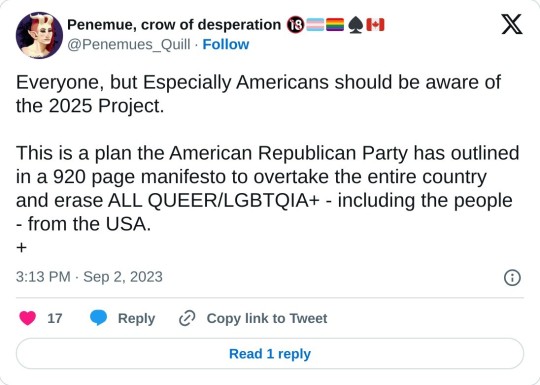
This thread is incredibly important to read.
It is also extremely difficult to read. I don't know if I need to point this out, but the document itself is obviously full of bigotry so please take care of yourself if you choose to read it. Antisemitic phrases like "cultural marxism" and "global elites" appear before the document even really gets rolling, and are mixed in with transphobia, racism, and more.
If you want a taste of how this document starts in the first main section about "The Family", here is a taste:
"This starts with deleting the terms sexual orientation and gender identity (“SOGI”), diversity, equity, and inclusion (“DEI”), gender, gender equality, gender equity, gender awareness, gender-sensitive, abortion, reproductive health, reproductive rights, and any other term used to deprive Americans of their First Amendment rights out of every federal rule, agency regulation, contract, grant, regulation, and piece of legislation that exists."
It is all bad. ALL of this document is bad, and dangerous, and threatens the lives and the safety of everyone living in this country.
#uspol#us politics#election 2024#lgbtq#queer#transgender#feminism#intersectional feminism#trans rights#queer rights#lgbtq rights#social justice#poc rights#racial justice#civil rights
31K notes
·
View notes
Text
A Big TB Announcement
Greetings from Washington D.C., where I spent the morning meeting with senators before joining a panel that included TB survivor Shaka Brown, Dr. Phil LoBue of the CDC, and Dr. Atul Gawande of USAID. Dr. Gawande announced a major new project to bring truly comprehensive tuberculosis care to regions in Ethiopia and the Philippines. Over the next four years, this project can bring over $80,000,000 in new money to fight TB in these two high-burden countries.
Our family is committing an additional $1,000,000 a year to help fund the project in the Philippines, which has the fourth highest burden of tuberculosis globally.
Here’s how it breaks down: The Department of Health in the Philippines has made TB reduction a major priority and has provided $11,000,0000 per year in matching funds to go alongside $10,000,000 contributed by USAID and an additional $1,000,000 donated by us. This $22,000,000 per year will fund everything from X-Ray machines, medications, and GeneXpert tests to training and employing a huge surge of community health workers, nurses, and doctors who are calling themselves TB Warriors. In an area that includes nearly 3,000,000 people, these TB Warriors will screen for TB, identify cases, provide curative treatment, and offer preventative therapy to close contacts of the ill. We know this Search-Treat-Prevent model is the key to ending tuberculosis, but we hope this project will be both a beacon and a blueprint to show that It’s possible to radically reduce the burden of TB in communities quickly and permanently. It will also, we believe, save many, many lives.
—
I believe we can’t end TB without these kinds of public/private partnerships. After all, that’s how we ended smallpox and radically reduced the global burden of polio. It’s also how we’ve driven down death from malaria and HIV. For too long, TB hasn’t had the kind of government or private support needed to accelerate the fight against the disease, but I really hope that’s starting to change. I’m grateful to USAID for spearheading this project, and also to the Philippine Ministry of Health for showing such commitment and prioritizing TB.
—
One reason this project is even possible: Both the cost of diagnosis (through GeneXpert tests) and the cost of treatment with bedaquiline are far lower than they were a year ago, and that is due to public pressure campaigns, many of which were organized by nerdfighteria. I’m not asking you for money (yet); Hank and I will be funding this in partnership with a few people in nerdfighteria who are making major gifts. But I am asking you to continue pressuring the corporations that profit from the world’s poorest people to lower their prices. I’ve seen some of the budgets, and it’s absolutely jaw-dropping how many more tests and pills are available because of what you’ve done as a community.
—
I don’t yet have the details on which region of the Philippines we’ll be working in, but it will be an area that includes millions of people–perhaps as many as 3 million. And it will include urban, suburban, and rural areas to see the different responses needed to provide comprehensive care in different communities. This will not (to start!) be a nationwide campaign, because even though $80,000,000 is a lot of money, it’s not enough to fund comprehensive care in a nation as large as the Philippines. But we hope that it will serve as a model–to the nation, to the region, and to the world–of what’s possible.
—
I’m really excited (and grateful) that our community gets to have a front-row seat to see the challenges and hopefully the successes of implementing comprehensive care. Just in the planning, this project has involved so many contributors–NGOs in the Philippines, global organizations like the Partners in Health community, USAID, the national Ministry of Health in the Philippines, and regional health authorities as well. There are a lot of partners here, but they’ve been working together extremely well over the last few months to plan for this project, which will start more or less immediately thanks to their incredibly hard work.
1K notes
·
View notes
Text
Astro Observations pt 2

1.If you have sun conjunct ascendant//sun in 10th house, people might really see who you really are or your real personality maybe visible to people you choose to interact with.

2. People who's sun and mercury match, they more than most of the time, say what they really mean

3. People who have Sag sun/stellium usually have a strong liking for some kind of mainstream media, like kpop? football? bollywood?

4. The sign of your fifth house can influence how you like spending your leisure time. Example:
Capricorn 5th house might like cleaning as a form of relaxing or spending their free time
Leo 5th house might want entertainment or hanging out with a group of friends, social circles
Gemini 5th house might like scrolling the internet or talking about their favourite shows and dramas
Pisces 5th house might like day dreaming or doodling or creative working
Libra 5th house might put make up on just because, or doing a whole self care routine
Taurus 5th house might just lay in bed and sleep? lol maybe cook something or play some instrument if they please.
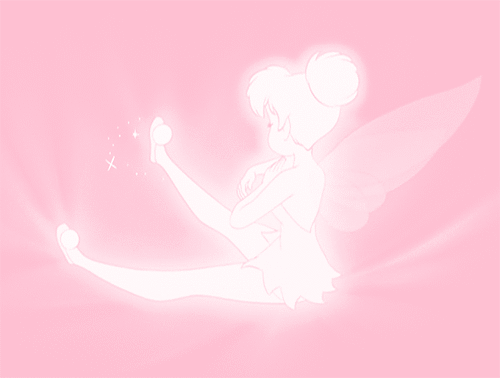

5. Jupiter is said to expand. People who may have sun conjunct Jupiter may have huge sense of self or awareness of identity, which is really good in a world where people try to tell you who you are. However, this needs to be checked so it does not turn into a huge ego

6. Sagittarius women could really like dancing

7. 8th house stellium could deal with sleep paralysis or insomnia or some kind of mental health related problem at some point in their life for sure

8. 12th house stelliums could really like day dreaming a lot

9. Most Libra people I have met are usually already well liked regardless of anything. and the ones that aren't, really care about being liked by people.

10. Speaking of this, most libra placements, esp suns, may really be gossiped about or do gossips.

11. Sagittarius placements (sun and rising esp) always have something going on with their teeth. Its either crooked, it may have had an injury and even if its perfect, they might be a little insecure about it at least for a brief period in their life

12. Neptune in 7th house could mean the native has kind of like imaginary ideals about their partner. It could also be that they "like the idea of someone more than the person" or straight up like imaginary characters as ideals

13. Sag mercury women usually are very vocal. May advocate for things like unequal rights, feminism, maybe the first one to speak. tbh sag mercuries overall are the types to take part in global challenges and really take time out to think about it seriously.

14. Sun in 8th house is a mysterious placement. Sun in 8th house won't reveal themselves to you. To be fairly honest, growing up their personality goes through a lot of transformation before they finally get to even know themselves and who they are. They could also be very introspective if not self aware

15. while Moon in 8th house natives are usually said that they won't reveal their true emotions, I'd say that's subjective since they are actually "aware" of their feelings on a deep level. This depends on the sign and degree of the moon imo. However, they may instead absolutely illusion you into thinking "you know everything about them" lol. Also, they could eventually get very emotionally intelligent in their lives with time. They may also never fully reveal their past to someone.

16. Moon in 8th house can have two moods. I know this will happen. See this happened. OR I know EXACTLY why this did not happen lol. Very intuitive.

17. Moon in Gemini degrees can indicate being able to verbalize and intellectualize emotions better than most people. While Moon in Aquarius or Capricorn may suggest otherwise.

18. Idk how but most Aquarius people I have seen have either of these two things. Being extremely different than most people (in a good or bad way) in some way or the other, a different thinking than most. OR, being really really good with Internet related stuff, like maybe freelance? Digital Media? Social Media?

19. Venus/Sun/Moon in virgos will get you the small thing you mentioned in a random seemingly unimportant conversation for your birthday gift.

20. A placement that makes me think of "attractive personality" is Venus in harmonious aspects with mercury.

21. Mars in 5th house/1st house are said to be automatically physically active or athletic. While this maybe true, mars or any other planet at a weak degree or Mars in Earth signs may not manifest that way, even though it may seem otherwise.

22. I think mercury in 11th house is an OG placement for over thinkers or the people who are thinking how would it feel to get married while riding the car/train and looking outside, or being constantly in their head the second they woke up.



23. " I am so stupid in love"- Pisces, Cancer placements.

24. Neptune in 3rd/11th house placements could have a social media or chronically online addiction.

25. Sun in 1st house in SR can indicate getting a sense of identity and purpose and moreover finding yourself again

26. Uranus in 12th house in SR can indicate a change/transformation in old belief systems and thoughts
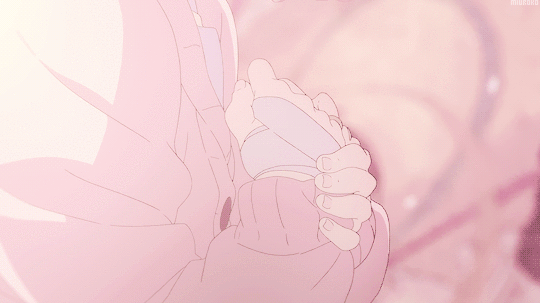
Well, I am thinking of making proper dedicated posts now instead of random notes like that. What suggestions do you have? I would loveee to know.
#astrology#astro notes#astro thoughts#astro#astro tumblr#astro community#astrology placements#astro observations#astro placements#astro posts#astrology community#astrology notes#astroloji#cancer moon#pisces#zodiacsigns#zodiac#horoscope#virgo#virgo sun#moon in 8th house#sagittarius#lilacstro observations#lilacstro#lilacstronotes
744 notes
·
View notes
Note
My question about the AIDS crisis, I'm mostly asking you because like I said, I don't think I was googling the right things, so even if you could just suggest some things to google that would be more likely to get me answers, that would be really helpful.
I guess it's mostly how did AIDS (and to some extent, any STD) become so widespread? I know that it spread through sexual contact and shared blood, but can you really "six degrees of separation" (god, that sounds so flippant, but i genuinely can't think how else to describe it) a chain of sexual partners and shared needles through any two people with HIV in the entire world? Maybe it's just because I'm a bit of a hermit, but while I can understand how it was so devastating once it was already widespread, I guess I'm having trouble understanding how it got such a foothold in the first place. If the first person with HIV had happened to not have a lot of sex would the AIDS crisis never have happened?
I swear I have absolutely no judgement for people that like to have a lot of sex, maybe I just have an underestimate of the amount of sex the average person has because frankly I don't have any? So I hope this doesn't sound disrespectful or anything, it's just kind of hard for me to believe those "six degrees of separation" kind of things in general when it's not like, famous people, so the realization that theoretically any two people with the same STD, on different parts of the globe, would have this string of sexual partners connecting them almost feels like there has to be something I'm missing... But when I'm googling things like "how did HIV become so widespread" and "how do STDs spread" I'm just getting things about how you should use protection and histories of *where* HIV spread rather than answering this more specific question (probably didn't help I was trying to do this research at 1am)
I mean this as kindly as possible:
What is your proposed alternate theory as to the spread of a disease which is transmitted through contact with blood, semen (and pre-seminal fluid), rectal and vaginal fluids, and breast milk? The disease does not spread through saliva or through touch which does not involve those fluids.
There are relatively rare cases of HIV spread through accidental needle sticks - according to WebMD, there are approximately 385k accidental needle sticks among health care workers per year in the US. WHO says that .7% of the global population has HIV, so for some back-of-the-napkin math, at most, you'll have about 2,700 of those needle sticks involving someone with HIV. Since (again, according to that WebMD article on accidental needle sticks), in cases of an accidental needle stick where the patient has HIV, the health care worker only has about a 1 in 300 chance of catching it (as opposed to 1 in 3 for an unvaccinated person catching hepatitis B via accidental needle stick from an infected patient). So - nationwide - you have approximately 9 people per year catching HIV from a needle stick.
And, to be clear, that fucking sucks. However, according to the Bureau of Labor Statistics, in 2022 there were approximately 14.7 million health care workers in the US. Not all of these people have equal risk for accidental needle sticks, but there's only so much research I'm gonna do for rough math to answer an ask on Tumblr.
The average US health care worker has approximately - again, based on my back-of-the-napkin math - 0.00000544% chance of contracting HIV from an accidental needle stick. It's astronomically more likely that a random health care worker will die from tripping over an extension cord or breathing in a caustic chemical than that they will catch HIV.
The chances of getting HIV via blood transfusion before we started routinely testing for it were all but assured if you got blood from someone with HIV. Testing now is so stringent that you have about a one in two million chance of getting HIV from a transfusion. The last recorded case I could find was in 2010, and before that, it was 2002, and the 2010 case happened in part because the donor lied about his risk profile and often participated in anonymous and unprotected sex with partners of multiple genders. He really shouldn't have been accepted as a donor at all. Approximately 4.5 million Americans receive blood transfusions per year, so, like, nowadays, it is excessively unlikely, but even in the 80s, it was an edge case means of infection, not a main source of pandemic spread.
A breastfeeding parent with a detectable viral load has about a 15% chance of transmitting HIV through breast milk. Likewise, HIV can be - and was - transmitted to babies during birth because of contact with vaginal fluid or blood, but, again, these relative edge cases are not the things pandemics are made of.
I want to stress that I am not in any way minimizing the absolute tragedy of the AIDS crisis, and I am not dismissing the fact that these methods of transmission are possible and did cause significant disruption to blood banks, stress for pregnant people with HIV, and so on. They just simply are not major methods of transmission, and never were.
With all of that said... what is your proposed alternate method of transmission, with these facts in hand? What do you think happened? Genuinely, this question is so baffling to me.
I think it's important to understand that before the emergence of HIV, most of the STIs we had were at that point either considered an annoyance (warts, HPV) or were extremely easy to treat and cure (syphilis, once a death sentence, became basically a non-issue for most people in the US as long as they were getting tested relatively frequently, and most other common STIs even today can be cured with a single course or even a single dose of antibiotics).
With that in mind, a lot of people, including a lot of queer people, were having a lot of unprotected sex. For people who could become pregnant, the advent of the pill and access to legal abortion meant that they didn't have to become or stay pregnant if they didn't want to, and for cis gay men, the prevalence of antibiotics meant that the vast majority of STIs were a brief inconvenience at worst.
So allo people did one of the things that allo people (and some ace people!) love to do:
They fucked. A lot. They fucked without fear of much consequence in terms of infection, and because it was much riskier to bring someone home where you could be seen, a lot of gay men cruised, fucking in parks or in literal back alleys or the bathrooms of clubs. They worried about getting arrested or getting caught and having their names in the newspaper much more than they worried about STIs. Sex workers, including trans sex workers, fucked in cars or hotels or... wherever the money was, because survival sec work is ... survival.
So... yeah. What is your proposed alternate theory, here? I am truly baffled at what you think otherwise happened, given a disease with a very narrow route of infection.
749 notes
·
View notes
Text
the scorpion doesn’t care who it stings
I posted this on my Facebook four days ago, and it seems to have taken on a life of its own for a minute.
I thought I’d repost it, here:
I can not fathom the emptiness, the insecurity, the insatiable need for attention and validation, the staggering arrogance, the malevolence and total void of human experience that is Elon Musk.
He's the richest man on the planet. You can't go anywhere or do anything without interacting with something he's part of in some way. There are literal millions of people who uncritically worship him, in spite of overwhelming evidence that he's a douchebag. Some number of them will come after me, as they come after anyone who points at their naked emperor. They'll spend entire days going after me and people like me, slavishly serving a man who does not even know they exist. They are his army of fools, uncritically serving his every whim. And it still isn't enough.
He can have any material thing he wants, and he will *never* be happy or satisfied. He has no real friends. Every single person around him is either a viper, a parasite, or both.
So what does he do? He bullies and threatens and harasses and trolls and behaves like the weak, scared, insecure child he has always been. That's a tragedy for him, but it's dangerous for us. He doesn't care what he destroys or who he hurts as he chases this existential thing he cannot ever have.
You know the saying "hurt people hurt people"? He's a hurt person who is hurting our society, making people I care about less safe. The consequences of this one man's midlife crisis are global, and that terrifies me.
In a comment, about an hour later, I added:
You know what's really interesting is the tiny number of people who are attacking and harassing me are either typical right wing idiots who all spew the same garbage from behind their wraparound sunglasses, or these weird nerds who are DESPERATE to justify how toxic and cruel and destructive Elon Musk is. Like, nerds, listen to Old Man Wheaton, please.
Don't hitch your wagon to Elon Musk. There are countless people who are amazing and genuinely good, who do all the things we wish we could do. Stop defending this piece of shit who would push you into a volcano without even learning your name, if it would save him half a second on his way to his next shitpost on $8Chan (formerly known as Twitter).He doesn't stand up to anyone. He doesn't stand up FOR anyone. He is not your champion. He's angry and chaotic and destructive, and you have to understand that the scorpion doesn't care who it stings.
Finally, I want to add two things: 1) It’s interesting to me that a lot of the people who came to my post to be dicks used a lot of MAGA language. It reminds me of this thing my friend says about concerts: the audience looks like the band. Of course there’s substantial overlap between the angry, hateful, terrified, cowards who support Trump and the same who Stan Elon Musk, and it’s real interesting to see it in action.
2) I haven’t used Twitter for years. I quit before it was popular (lol) because it was better for my mental health. I logged in once when my book was published, and I deleted all my tweets when he announced he was buying Twitter. When he took over and immediately amplified a conspiracy theorist, I made my account private. In a perfect world, I would delete my account entirely. But I have to keep it for reasons I hope I don’t have to explain. After I posted this on Facebook, it made its way around Twitter (still is, four days later, which is ... a thing that is happening) and when people went to look at my account, they saw that it was closed. As much of a fucking manbaby Elon Musk clearly is, he didn’t do anything to my account. In fact, the only reason he even knows I exist (if he does) is through a vanity search of his name. I locked my account on my own, and so should you.
I am only on:
Tumblr
Facebook (itswilwheaton)
Instagram (itswilwheaton)
and my blog that I’ve been neglecting for too long at wilwheaton.net.
I’ve had a Reddit account since 2006, predating user-created subs! I’m u/wil there.
Okay that’s all. Thanks for listening. Please choose to be kind.
7K notes
·
View notes
Text

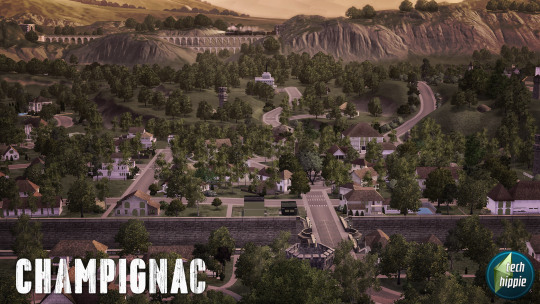

CHAMPIGNAC : A NEW SIMS 3 WORLD
Champignac is a fully living Frenchy suburbia World based on Champs-les-Sims and has nothing to do with a vacation place ... Well, nothing is not really the right word ;)
Back in 2016/2017, when we began to think how we could remade Champs-les-Sims, we didn't know really what kind of world we wanted to do. We named the project : Sims de Nimes. Then, because we were on other projects ( such as sims 4 k-mods ) we left Sims de Nimes somewhere in the pipes.
We made Oaksoak Hollow ( based on Mystic Falls ), we made Eureka Valley ( a world between tech and classic life ) and we left behind the Sims 4 because, well ... too long to explain. :D
So, it was time to get out of the box our old project of Sims de Nimes ... During this time, some talented creators re-made Champs-les-Sims with their own vision, more oldy or more city life like, or more like Sunset Valley ... All those versions are interesting, but we wanted something else. And so, is born Champignac !

If Champignac is a true living suburbia world, it is too a quite rural world, almost a village with :
37 Community Lots
36 Residential Lots
10 Medieval Towers all around the town :)
:)
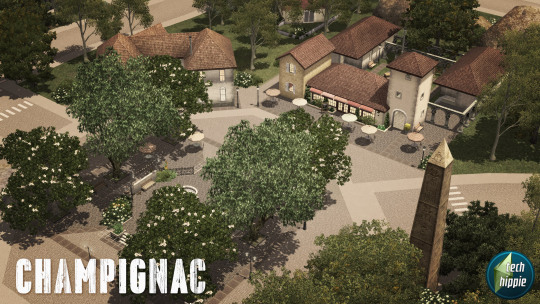
In addition, it remains few Empty Lots, differently sized to suit whatever you wish ... So, let's say Champignac is a french-not-so-little-town where life is slowly flowing and dynamic at the same time, perfect for families and Sims looking for a different lifestyle :)
A typical downtown and outskirts, full of old buildings and southern architecture, a joyful mix between south-east and south-west housing, with a touch of something more northener ( but don't tell the citizens; it's a sure way to be frowned upon ) ... After all they worked hard to keep Champignac as it is!
People living in Champignac are quite glad of it. Sure, teenagers dream of foreign lands, but they are not too eager to leave.
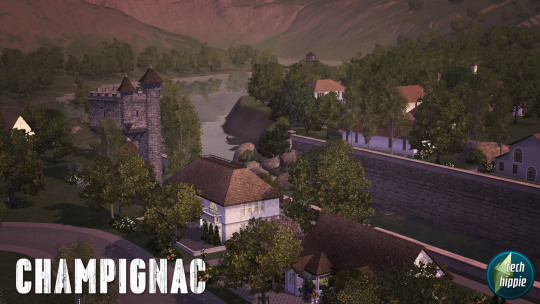
Once, the townies of Champignac were grumpy because Champs-les-Sims was so more popular than their hometown ... After all, everybody went to Champs-les-Sims, stayed there, made nectar, drove a Kenspa, flirted with locals, or … anyway!
Tourists had a full experience in Champs-Les-Sims and weren't interested in visiting any other city. Champignac, the official twin city, didn't benefit from any international exchanges, and was left anonymous, far from fame and glory. As unreachable as the Eiffel Tower seen from Champignac ... until ...
In February 29th of a certain year, a distant descendant of Marquis de Landgraab lost his way on the road to Champs-les-Sims and landed in Champignac. Instantly, he fell in love with the town.
He saw an always growing vegetation, a Monastery full of secrets, the familial beach ( yes, there is a beach in Champignac ), the forgotten obelisk, the shop keepers full of stories, the well preserved houses, the green fields and the paved streets, the true Café Catane and a remaining wild fauna running here and there ... He saw perfection !


For a time, the townies of Champignac experienced fame and glory. But how exhausting it was! Tourists not really caring about the legacy of the kiosk owner, the monks overwhelmed, the museum director who couldn't find enough teenagers to help ... Even the fishes were exhausted! Hard times indeed ... Happily, this descendant of Marquis de Landgraab met someone, somewhere, and moved out, far far away from Champignac. Celebrities said their last goodbyes and slowly, life, as it should be, was back :) The townies and City Council learned from that experience that they very much preferred not to be as famous as Champs-les-Sims ...
Life in Champignac was relatively calm again when suddenly, a global health crisis emerged and the Simvid-18 pandemic hit many many people ... Anxiety swept through the villages and the small towns, including Champignac of course ... With an aging population, residents became increasingly concerned about the well-being of their neighbors and the future of the city.



Shop owners and farmers who were already considering retirement were now faced with the daunting task of deciding whether to continue their businesses in such uncertain times. The entire world seemed to come to a halt, leaving everyone in Champignac wondering who would carry the torch and ensure the future.

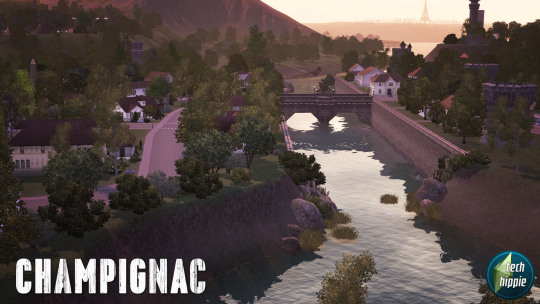
Surprisingly, the youngsters that only came sporadically for holidays, moved back to Champignac. Fearful of living in a crowded city and eager to gather with family members, they came to the old town with friends. After all, there were spare bedrooms in most houses!

When the restrictions were lifted, many were reluctant to leave. Going back to a stressful life and fast-paced city wasn't enticing anymore. Most decided to turn their lives around. They took up the florist shop or asked for a job transfer ... So, life emerged again :) Champignac is now a thriving town where you have everything you wish for and nothing more.
Champignac is blessed with old churches turned into bars or wineries, old palazzi that are inspiring, and small boutiques as gathering places ...

Winters and autumns are short, while spring and summer are long. Come and live among thousands of old buildings, walk on streets Roman soldiers once trod upon, see treasures from foreign campaigns, and benefit from the perfect blend of country living and town living.


Remember ... With its unique blend of history, culture, and natural beauty, Champignac offers the Sims a captivating and enriching experience. From the stunning architecture to the delectable cuisine, every aspect of this town reflects the South of France’s intoxicating charm.
Are you ready to move in Champignac ?
blackgryffin \o/
IMPORTANT : We advice STRONGLY to begin with the half-populated SavaGame provided in addition to the World itself ...
DO NOT FORGET to download the CC of Champignac we provide on our website too ! for more information, see the 2 posts below ;)
Have fun !
DOWNLOAD HERE
#sims 3#sims 3 custom content#sims 3 worlds#sims 3 world#sims 3 cc#k hippie#sims 3 build#champignac#champs les sims#sims de nimes#k-hippie worlds#k hippie worlds
1K notes
·
View notes
Text
Best Practices for Communicating about the Climate Crisis
Communication Tips
Keep it local. Focusing on bringing local solutions. You can lean into community pride to help motivate community action. And while climate change may have global impacts, emphasizing local climate impacts and benefits of local policies will resonate with more people, and feel more approachable/doable.
Stay focused on solutions. While the consequences of climate change are dire, focusing too much on how bad things could get tends to make people feel overwhelmed, hopeless and cynical – which doesn’t help them get or stay involved. Try not to give more than 1 or 2 examples of local consequences of environmental issues, then dive into how this work provides solutions.
Include your audience. Instead of using “I” or “you”, talk about what “we” need to do to turn things around. This includes using “we” when you’re talking about the government, when appropriate - after all, the government is meant to be for and of our communities.
Lean into moral values. Most people agree that we have a moral responsibility to protect our environment’s health, stability and safety for future generations, so don’t be afraid to talk about that or other values that resonate with you about this work.
Focus on tangible gains. Things like “the economy” are important, but they don’t feel as immediate as combating rising costs, protecting their and their neighbors' health, and saving money. Paint them a picture of the prosperous, stable, livable city we can create.
Project a can-do attitude. A lot of people are feeling let down by leadership at all levels, and feeling hopeless and helpless about making change. So, it’s important that you show that you and others are out here willing to really do the work - and there’s room for them to join in. Also, be sure to talk about successes.
Don’t waste time on opponents. We can't get everybody on our side. However, there are enough people that are excited about the prospect of living in a safe, sustainable community, where everyone has clean air to breathe/water to drink and a family-sustaining job that we don't need to convert opponents.
Encourage investment. Rather than framing the changes we want in terms of the drudgery of having to adapt to a bad situation, try to build excitement in the possibilities we can invest in - together. Everyone likes to feel they’re getting in on an exciting, cutting edge investment. Relatedly, be wary of statements that make people feel like they’re going to lose, rather than gain, options. Remind people that our current systems are not only unhealthy, dirty, and dangerous - they’re also ineffective.
Create immediate avenues for action. Once you’ve built up some excitement about what we can do, give people an immediate step they can take to help. Give that positive energy somewhere to go and show them how good it can feel to get involved.
Focus on what you want people to do, not what you want them to stop doing. This helps people envision change, and makes them less nervous.
Communicate respect. Keep away from stereotypes and harmful words. And when you talk about other people, be careful not to put words in their mouths.
Remember, you're not just combating ignorance, you're combating hopelessness, helplessness, and burnout!
2K notes
·
View notes
Text
I'm over the term "gender equality", and the way in which it is being used and advocated for by the mainstream, status-quo left.
"Men and women are equal" operates under the bias that men are the default standard of equality, which women are then sometimes required or expected to meet. Usually statements like "women are just as strong as men", "women are just as capable as men in sports" act as support.
It intentionally is meant to be cheered on as liberating, but the reality is it's a derivative of "I don't see race I just see people", "no race but the human race", "not disabled just differently-abled", etc. It's a form of sexism that ignores sexism. It's "I am going to ignore biological differences based on sex" when the reality is being of the female sex shapes both my material and lived reality in extremely complex ways and can have dangerous consequences when ignored.
The average woman is not is strong as a man and it often takes a deliberate amount of persistence, training, and/or testosterone injections for us to come close to or meet the male default. "The muscle strength of women indeed, is typically reported in the range of 40 to 75% of that of men". The average man could easily kill and overpower me, and if I were an athlete a man who trained equally to me would defeat me in competition.
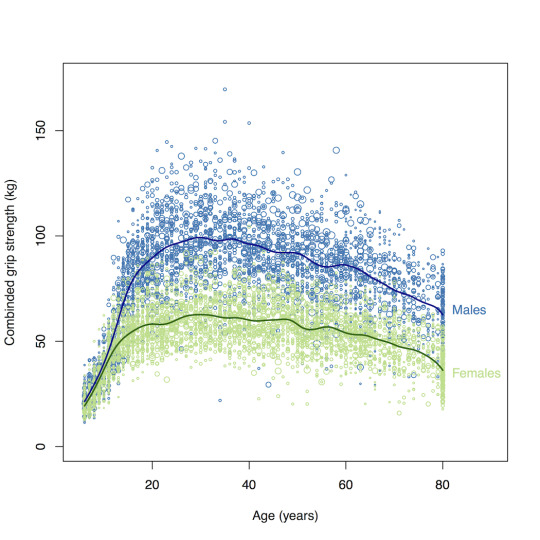
Women are 47% more likely than men to be injured in a car accident. Cars were designed for male drivers. In 2011 was when "female" crash dummies were introduced into measuring car safety in the US, however sometimes organizations in the US and UK just used "scaled down male dummies" to test car safety for women. As this article explains, we are not scaled-down men. We have different muscle mass distribution. We have lower bone density. There are differences in vertebrae spacing. Even our body sway is different. And these differences are all crucial when it comes to injury rates in car crashes. And what about pregnant women?
We have different needs and different experiences than males and the world around is us designed with males in mind - from housing to automobiles, to entire economic systems. 85% of women will eventually be mothers. When women take maternal leave to care for a newborn while the man continues to work (or returns shortly later), he effectively advances his career and over time earns more promotions and pay. His schedule is to focus on his career growth and then come home for a few hours in the evening to play with their child (or play videogames). Mothers pay a significant wage penalty for having children from being months out of the labor market.

This list could really go on.
"Gender equality" is utilized by men to distract women from focusing on only women's rights and needs to men's rights and needs. It's used to shoehorn in arguments of "men too" and sympathizing with men on "men's mental health" (while neglecting the fact that men are overwhelmingly and in shocking numbers responsible for violence done to both sexes - and are additionally unlikely to want to work on themselves mentally).
Reframing and enfolding "violence against women", "women's rights", "male violence", "female liberation", and "women's oppression" into the vague language of "gender equality" is a deliberate act of obfuscating the power dynamics between the sexes - in which men globally exploit and oppress women on the axis of sex.
And as vague language, carves a place for people to have the opportunity to shift the responsibility and blame onto women and girls for the suffering that men wield onto their own sex.
Women and girls do have advantages and strengths over men and boys due to our biological differences - yet this, too, goes ignored under the vague concept of "gender equality" and the cultural belief system it evokes, which treats man as the mold that women should fit.
#gender equality#gender#feminism#radical feminism#gender critical feminism#female liberation#women's rights#women's oppression#misogyny#intersectional feminism
268 notes
·
View notes
Text
So, I'm not really in the weeds of Transgender Discourse on the internet (I have a life and also care about my mental health) but I've seen something discussed here about trans masculinity and I wanna talk about it.
I'm very masculine. I'm butch, I'm trans masc, I've always wanted to be masculine and I feel most comfortable when I'm presenting as such. Without much effort or any intention on my part I am read as a cis man day to day. Because I don't present more fem, in queer spaces I am read and recieved as a man, maybe trans, probably into other men. People do not even consider if I'm a butch lesbian unless there's Significant context indicating it. Because of this I'm viewed through 'Man Lens'; It feels a different if I say 'bitch', if I talk about my attraction to women. I don't get smiled at, people put physical distance between me and them as much as possible.
This is familiar for a lot of trans masculine people and trans men that aren't androgynous/fem leaning in their style, and it is an upsetting change to happen. It makes us feel judged or misunderstood to suddenly be causing this wariness in others; it feels prejudiced. I've seen people putting words to this like transmisandry. This is something they want to lessen in their communities, so they don't have to experience this anymore.
Now, here's my opinion part: That's not going to happen. You cannot tackle the "problem" of people responding to your masculinity with wariness. They aren't controlling the wariness, they can't. More importantly, their wariness toward masculinity and what registers in their brain as "man-like" is well founded. It's based in lifetimes of experiences and trauma that has told them men can be very unsafe to be around, and that is true. Most men are cis, and cis men are the most threatening thing in this world to non-cis men. They are usually* socially privileged above others, more likely to inflict violence, more likely to abuse and murder others, are typically physically more powerful than others. Everyone thats not a cis man DEEPLY internalises a very rational wariness of men, and masculine presentation as an extension. Especially men that are strangers. (*This is of course different when we consider intersections of race, colonialism, classism, ect. But globally this generalisation is still pretty accurate.)
Honestly, I don't think this wariness towards masculine presentation is something thats useful or realistic to challenge. Like many internalised processes it's probably a good idea to examine it and consider its usefulness, but I think it'd be easy to conclude that it is a useful wariness for people to have. Women have lots of reasons to be wary around men, including the unique threats of transmisogyny. Queer and gender deviant men have lots of reasons to be wary around men. This is The Reality of patriarchy.
Personally, the place I've come to with how women and queer people react to my masculinity (which is not entirely negative btw, the wariness is just one aspect) is that... I understand their wariness. I have it too, toward those my brain assumes are cis men. I cannot control how they feel or what they think about me. I can only be respectful to others and to myself and live my life. I flag my butchness where I can, I make my gender clear to those it matters to, and the rest I accept as largely beyond my influence. All of us have to do this in some places in our lives.
Even though my masculinity makes other queers wary, I have lots of friends! I've had no real trouble dating or finding intimacy. Initial wariness is just that. Once you understand each other, break the barrier, its usually settled. For anyone who finds my masculinity so offputting that we can't break the barrier, I'm glad neither of us put each other through that discomfort. I understand where a fear like that comes from. I will still hold community with them because that's what solidarity entails.
Anyway thats my ramble about masculinity in queer community, good bye until another. who knows how long
#back on the tumblr diary#personal#edited the section about women having reasons to fear men and transmisogyny; poorly phrased lol.
140 notes
·
View notes
Note
AITA for telling my friend that I'd rather die than to go to America?
(🪿🐢 -> for finding this post)
I (28x) live in a global south country with many problems, and I've always planned to apply for a PhD in a better country. Problem is, I need it to be fully funded (as in, the university will pay not only my tuition but also a salary) because I don't have the money to sustain myself—Even a simple meal could bankrupt my family. Therefore my options are limited. The country I'm aiming for has to A) have fully funded courses and B) easy access to getting citizenship.
All these considered, my two options are the USA and Canada. In truth, the USA is a better option, because Canada doesn't have that many good universities for my major, and the fund is usually lower than the USA. But I don't really want to go there for Visa reasons (it's very hard to get a Visa from here), for its health care system (I'm chronically ill and need medical attention every month at best) and for the general atmosphere.
Here's when I may have acted like an asshole.
I was venting to a friend (31x, American), bemoaning that I have few options and it might limit me. I let it slip that I could also consider the USA as an option, and they suddenly became too excited about this. They kept telling me to forget Canada, saying things like "there's no future in Canada" or "everyone there immigrates here anyways" which may have been true, but they weren't that important to me. I told them that I don't find America to be a suitable place for me, which made them act a bit defensive, saying that Canada isn't that different from America in many aspects, and then they threw this line at me: "America can't be worse than [where I live]."
While this is true, I don't think they have the right to say it like this. I got very angry, told them that I'd rather die than go to America and they live in delusion, what's the real difference between my country and theirs? Both are horrible in their own unique ways and I don't want to get out of a hole and into a well. They told me that I'm an asshole, acting all high and mighty, and haven't talked to me since. I told my brother about this, and he told me that I shouldn't disrespect anyone's country like this and I should've been more tactful about it.
So, people of Tumblr, AITA?
What are these acronyms?
174 notes
·
View notes
Text
Butler argues that it would be “counterproductive and wrong” to chalk up the existence of oppressive systems to biology. But why? I am of the opinion that any comprehensive movement for trans rights must be able to make political demands at the level of biology itself... Suppose women’s oppression really is a product of their biology, Firestone wrote. What follows? Only that feminists must work to change biological reality.
The genius of this gambit was to refuse the idea that biological facts had some kind of intrinsic moral value that social or cultural facts did not. Biology could not justify the exploitation of human beings; indeed, it could not even justify biology, which was just as capable of perpetuating injustice as any society.
Sex is real. So is global warming. To believe in their reality is an indispensable precondition for making normative claims about them, as we know from climate activism. But the belief that we have a moral duty to accept reality just because it is real is, I think, a fine definition of nihilism. What trans kids are saying is this: The right to change sex that has been enjoyed for decades by their parents, friends, teachers, coaches, doctors, and representatives, especially if those people are white and affluent — this right belongs to them, too. We should understand this right as flowing not from a revanchist allegiance to an existing social order on the perpetual verge of collapse but from a broader ideal of biological justice, from which there also flows the right to abortion, the right to nutritious food and clean water, and, crucially, the right to health care.
-Andrea Long Chu
91 notes
·
View notes
Text
I really don't care if you're "sick of masks". "Sick of getting shots every 6 months/year". "Sick of isolating when you're sick". I'm sick of people dying and being permanently affected by a deadly illness. I'm sick of people getting sick from preventable diseases. I'm sick of people forgetting there are people who cannot get vaccinated and or have immune deficiency that will be harmed by your actions (as well as non-immunodeficient/immunocompetent ppl that can be harmed too). I'm sick of people having this apatheticnattitude towards covid vaccination in the advent of rising anti-vaxx ideology which will in fact contribute to a global health crisis. I am sick of people having no compassion when their actions harm others. I am sick of people being knowable sick, going unmasked to a social event, and then not telling anyone or warning anyone. I am sick of you all accepting that the US government is okay with people dying of a pandemic that never ended, of creating the precedent for a terrible response to not just covid but ALL communicable diseases. I am sick of people not realizing that their actions do in fact contribute to science misinformation and disinformation and that they bolster the anti-science/vaxx movement. I am sick of people saying "just boost your immunity with vitamin C [insert supplement]" instead of promoting science based fact and real solutions. I am sick of people not advocating for removal of health barriers (ie cost, ie lack of access, ie the fact pharmacists cannot prescribe paxlovid in many states if you test positive, etc). I am sick of people acting like covid and the flu is a cold and that even having a cold is just alright to spread around. I am sick of people not treating covid and the pandemic as an issue of disability rights and not treating covid as a mass disabling event (which it is). I am sick of people treating the spread of communicable diseases as okay because "only those with disability or pre-existing conditions will die" and then it tells on themselves how little they care about disabled people.
I am sick of those things. Wear a mask and get vaccinated and test if you can. Spread science based evidence. Set boundaries with people who don't mask don't vaccinate spread misinformation. If you're positive isolate, inform those you've potentially impacted. Have compassion. Have allyship to those disproportiately affected.
99 notes
·
View notes
Note
I just read the article you posted a while back about TB (heads up- it said the gift article link has lapsed or some such). Did J&J ‘evergreen’ (be allowed to be evil) or was it allowed to become generic?
Relatedly, how do you manage empathy fatigue? I deal with OCD too and it screams at me that I have to care about and do all the things all at once. How do you choose where to put your time and energy?
(Also, when I get the coffee subscription for my husband’s birthday, which version should I get?)
For me empathy fatigue sets in when I careen my attention from this crisis to that one to the next one to the one after that, always feeling overwhelmed by each emerging problem but never having the time or attention to devote myself to one problem or another.
I'll give you an example. In 2014, a horrific ebola epidemic swept through Guinea, Liberia, and Sierra Leone. The world paid attention to it. Everyone was talking about it. And then .... it ended. At least in the global imagination. Money dried up. The world moved on to the next crisis.
That's not to say the next crisis wasn't important. It was important. But in Sierra Leone, the ebola crisis wasn't really over even after people stopped contracting ebola. 15% of Sierra Leone's healthcare workers had been killed by ebola, and the already fragile healthcare system plummeted into what one Sierra Leonean physician described to me as "a state of collapse."
And so the crisis remained a crisis even after the world's attention shifted. 1 in 17 women in Sierra Leone were dying in childbirth. Over 10% of kids born died before the age of five. Tuberculosis killed thousands every year despite curative treatment being available.
And this is when Hank and I finally, belatedly realized that responding to crises in the news was not adequate. Instead, we would need to commit the kind of long-term attention and long-term support that long-term crises demand. This means making difficult choices--there is also high maternal and child mortality in countries other than Sierra Leone, but we choose to focus on Sierra Leone because we see an opportunity to make a difference, because the government is serious if limited in its commitment to improving healthcare and educational opportunities, and because we had to make a choice or else we would be overwhelmed by the many causes.
What about the other causes? Well, we trust people to work on those causes. We believe in their importance. And we support their work by doing ours as well as we can, and trusting they are doing theirs as well as they can. I still get overwhelmed. I still get depressed. But I find that the deeper I go into my particular areas of interest--global healthcare delivery, health care accessibility, ending TB, fighting maternal mortality--the better I feel personally, and the more good I feel like I'm able to do.
2. Johnson & Johnson has not abandoned their secondary patents on bedaquiline but they have committed to allow generics to be available in most countries, even those where the secondary patents apply. Unfortunately this deal leaves out many countries that need generic bedaquiline, including Ukraine, which is absolutely unacceptable. So progress has been made, but the progress (as is so often the case) is inadequate. The fight goes on.
679 notes
·
View notes
Text
modern headcanons | highschool edition
⋆✮↪ neteyam, lo’ak, kiri, ao’nung, and tsireya
neteyam
he always walks you to class. he loves company, especially yours. neteyam would go the extra mile by carrying your bag or holding your stuff. and he’s so humble about it! he doesn’t even think that it’s something you should thank him for. to neteyam, it’s just the standard. he once told you that most of his childhood was spent with his mother and grandmother, two women in his life who really care about manners.
he packs extra lunch for you. neteyam is the type of guy to bring an extra lunch box just for you. if you’re not hungry or you brought your own lunch, he’ll insist you take it home. you don’t know what you did to deserve him. he would experiment with different cuisines and sneak in little notes that make you swoon. sometimes, you return the favor. when you pack his favorites, like steamed fish or grilled meat, he loses his mind. everyone finds your relationship sickeningly sweet.
lo’ak
he probably vaped at least once. he’s the type of guy to give into peer pressure. if someone offered him a blue razz ice elfbar at a party, he would try it without thinking twice. much to your surprise, lo’ak didn’t really get into it. he likes to brag about it though, especially to ao’nung. you scold him when he does. part of the reason why he tries to stay away from that stuff is because of you. he knows that you don’t like it when he jeopardizes his health, so he makes an honest effort to be mindful of his decisions.
he skips class. a lot. honestly, you’ve lost count of how many times he’s offered to “walk you to class” and lead you in the opposite direction. you guys usually stay on campus, like maybe in the janitor’s closet or under the gym bleachers. when you guys aren’t, though, you’re usually running off to a local gas station or even the mall. it really just depends on the class period. lo’ak isn’t exactly the best influence on you.
kiri
her favorite class is biology. it’s just the closest thing she could get to botany as a high schooler. kiri is interested in all things related to plants, to the extent that she started a club dedicated to maintaining the school garden. she doesn’t have any leadership positions like tsireya, though, but she likes it that way. kiri doesn’t want to feel the pressure of dealing with other people. she also doesn’t have the mental strength to be constantly reminded of the fact that global warming exists.
she skips class occasionally. you’re always surprised at how rebellious she’s capable of being. unlike lo’ak, she doesn’t stay on campus. she’s out the door when she gets the chance. instead of staying at places like the mall, though, kiri stays at the local park. it’s where she gets most of her work done. she usually doesn’t drag you with her against your will, because she understands that the risk isn’t always worth it. you’ve never said no to her, though.
ao’nung
he plays close-contact and collision sports. remember when he tackled lo’ak in that one fight scene? yeah. ao’nung would channel that energy into sports like basketball, rugby, and even wrestling. ao’nung isn’t a team captain or anything. that’s way too much commitment, but he does have the most influence. because he earns titles like “player of the game” or “star player,” ao’nung knows how to get sponsors for trips. you hate how it gets in his big head.
he sits behind you in every single class you have together. ao’nung finds it more convenient to talk to you this way. if there’s assigned seating, he’ll bribe, beg, or do literally anything else to sit behind you. it gets him in trouble most of the time, but it’s worth the effort. if it does work, though, ao’nung likes to braid small pieces of your hair or pass notes during class. your classmates give you two funny looks, but they never say anything about it. courtesy of ao’nung.
tsireya
she’s the captain of the swim team. she’s a natural in the water. she’s also very good at raising team morale, so there’s really no other person fit for captain. you always attend her swim meets and cheer her on as much as possible. if you’re being honest, she doesn’t really need it since she crushes the competition every single time. she literally brings home gold every single year. your school will literally never find another swimmer as talented as her.
she’s the head of the house and grounds committee. tsireya would be an environmental activist. she’s got a big heart. she spearheads all activities related to the environment in your school and even started a conservation charity. you have no idea how this girl manages all of that on top of sports and school work. it does get in the way of your quality time with her, but it makes her happy so you don’t complain.
(masterlist)
#avatar the way of water#avatar#atwow#atwow headcanons#Neteyam#neteyam x reader#neteyam headcanons#lo'ak x reader#lo'ak headcanons#avatar imagines#kiri x reader#kiri headcanons#aonung#aonung x reader#aonung headcanons#tsireya x reader#tsireya headcanons
221 notes
·
View notes